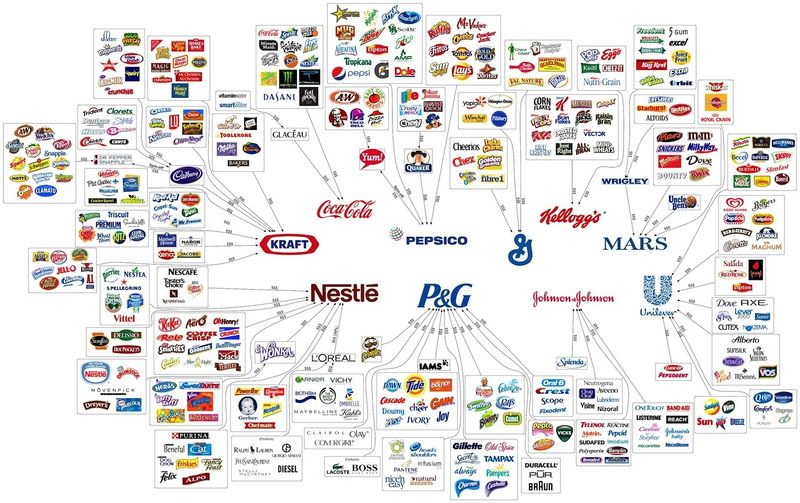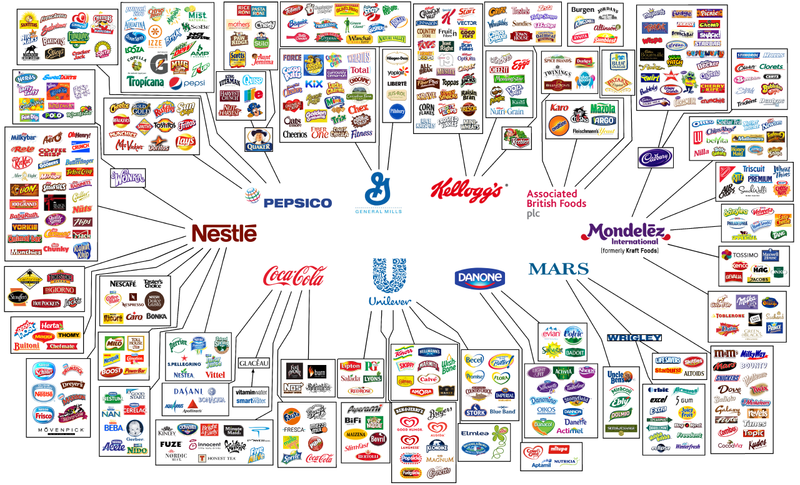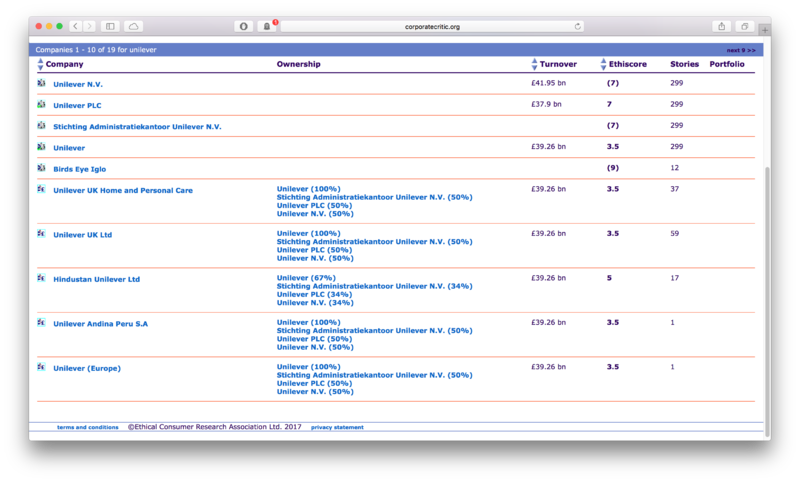Karina/special issue 03 interfacing the law: Difference between revisions
No edit summary |
No edit summary |
||
| Line 9: | Line 9: | ||
<br> | <br> | ||
https://cspinet.org/resource/rigged | https://cspinet.org/resource/rigged | ||
<br> | |||
''"And yet at the end of 2015, Clemmy’s went out of business. Its failure shows how today’s food marketplace is tilted in favor of the world’s largest food manufacturers and against everyone else—including companies offering better-for- you products." (Rivlin p.1)'' | |||
<br> | <br> | ||
<br> | <br> | ||
Revision as of 14:34, 11 May 2017
11 MAY
Vox: The hidden war over grocery shelf space
https://www.youtube.com/watch?v=ImZD2JGxbmc
Rigged: Supermarket Shelves for Sale by Gary Rivlin
https://cspinet.org/resource/rigged
"And yet at the end of 2015, Clemmy’s went out of business. Its failure shows how today’s food marketplace is tilted in favor of the world’s largest food manufacturers and against everyone else—including companies offering better-for- you products." (Rivlin p.1)
10 MAY
Vox: The "natural" label on your food is baloney
https://www.youtube.com/watch?v=X72KpJKKUhI#t=4.1432982
5 MAY

Found another version. Newer / outdated?

How could we represent these 'empires' as people?

4 MAY
Unilever
https://www.unilever.com/legal.html
https://en.wikipedia.org/wiki/Unilever
"Unilever is organised into four main divisions: Personal Care (production and sale of skin care and hair care products, deodorants and oral care products); Foods (production and sale of soups, bouillons, sauces, snacks, mayonnaise, salad dressings, margarines and spreads); Refreshment (production and sale of ice cream, tea-based beverages, weight-management products and nutritionally enhanced staples sold in developing markets); and Home Care (production and sale of home care products including powders, liquids and capsules, soap bars and other cleaning products).[78] In the financial year ended 31 December 2013, Unilever had a total turnover of €49.797 billion of which 36% was from Personal Care, 27% from Foods, 19% from Refreshment and 18% from Home Care. Unilever invested a total of €1.04 billion in research and development in 2013.
Unilever is one of the largest media buyers in the world, and invested around €6 billion (US$8 billion) in advertising and promotion in 2010."
Products - 13 $1 billion brands
- Axe
- Dove
- Heartbrand
- Hellmann’s
- Knorr
- Lipton
- Lux
- Magnum
- Omo
- Rama
- Rexona
- Sunsilk
- Surf
Lipton Tea
https://www.tripadvisor.com/Attraction_Review-g1073495-d3655567-Reviews-Lipton_s_Seat-Haputale_Uva_Province.html
Anual Report 2015
https://www.unilever.com/Images/annual_report_and_accounts_ar15_tcm244-478426_en.pdf
More reports
https://www.unilever.com/sustainable-living/sustainable-living-news/reports-and-publications/index.html
Bad press
Former manager sues Unilever over ‘illegal’ sacking (Daily Nation, June 2012)
http://www.nation.co.ke/news/Former-manager-sues-Unilever-over-illegal-sacking-/1056-1431282-ei34nh/index.html
Atwoli: dismissal of Unilever tea workers illegal (3 years ago)
http://www.hivisasa.com/posts/3912
"The court heard that the Kericho-based tea company dismissed a group of workers on diverse dates between November 2013 and April 2014 on allegations of violating a document termed as Code of Business Principles... The Kenya Plantation and Agricultural Workers Union on Thursday moved to the industrial court to stop the eviction orders by the tea company claiming the code of business principles was not brought to the attention of the employees."
Unilever Code of Business Principles
https://www.unilever.co.uk/Images/4394-cobp-code-policies-booklet-external.v12_tcm1252-409220_en.pdf
Unilever admits toxic dumping: will clean up but not come clean (Greenpeace, June 2001)
http://www.greenpeace.org.uk/media/press-releases/unilever-admits-toxic-dumping-will-clean-up-but-not-come-clean
"The company has also agreed to undertake a clean-up of 5.3 tons of mercury wastes it illegally dumped at a local scrapyard, but it is still refusing to accept that local people and workers at the factory in Kodiakanal may have been exposed to the highly toxic metal."
Tesco and Unilever fail test (The Guardian, January 2005)
https://www.theguardian.com/business/2005/jan/29/supermarkets.unilever
Ethical Consumer Information Systems
http://www.ethicalconsumer.org/shoppingethically/ourethicalratings/environment.aspx#pollution
http://www.ethicalconsumer.org/portals/0/downloads/categoriesa4.pdf
- environmental reporting
- climate change
- pollution & toxics
- habitats & resources
- palm oil
Ethical Consumer Research Association
http://www.corporatecritic.org/info/rr/ethiscore.aspx
- A company Ethiscore of 0 to 15 points. 15 is the best Ethiscore and 0 worst
- A product Ethiscore of 0 to 20 points. 20 is the best Ethiscore and 0 worst.
Ethiscores divided into categories
http://www.corporatecritic.org/categories.aspx
- Environment
- Environmental Reporting
- Climate Change
- Pollution & Toxics
- Habitats & Resources
- Palm Oil
- Animals
- Animal Testing
- Factory Farming
- Animal Rights
- People
- Human Rights
- Workers' Rights
- Supply Chain Management
- Irresponsible Marketing
- Arms & Military Supply
- Politics
- Controversial Technologies
- Boycott Call
- Political Activities
- Anti-Social Finance
- Company Ethos (+ve)
- Product sustainability (+ve)
- Organic Product (+ve)
- Fairtrade Product (+ve)
- Environmental Features (+ve )
- Other Sustainability Features (+ve)
- Animal Welfare Features (+ve)
Subscribe to see Ethiscores
http://www.corporatecritic.org/login/subscribe.aspx
- Annual Rate: £899 (ex VAT)
- Annual "Not for Profit" Rate: £699 (ex VAT)
- Monthly Rate: £150 (ex VAT)
- Monthly "Not for Profit" Rate: £120 (ex VAT)
- Daily Rate: £20.83 (ex VAT)
still managed to find some info without subscription. ethiscore 7/15

Dilma
http://ethicalteasociety.org/about-us/faq
Why is Dilmah not certified as Fair Trade?
We would not join the Fair Trade movement as Dilmah tea goes far beyond Fair Trade.
Fair Trade does not address the fundamental weakness of the tea industry. Although well intentioned, in the case of tea, Fair Trade perpetuates the outdated colonial model of raw material being imported into and packaged in the UK, where all the significant branding profits lie.
Only a small fraction of the Fair Trade premium charged to consumers for tea is paid to the grower, typically only 7% of the shelf price finds its way back as the total payment for tea supplied. Dilmah returns a minimum of 10% of pre-tax profits to growers, distributed via the MJF Foundation (see www.mjffoundation.org). This has a far greater impact on the tea growers and the Ceylon Tea Industry than Fair Trade. MJF Foundation funds are used to ensure, among other things, child nutrition, midday meals, educational scholarships, hospitals and school facilities as standard provisions for the Dilmah workforce.
Fair Trade is also not about quality, it’s a seal of approval to sell at a premium price appealing to consumer consciences. Any new brand wanting to sell an average quality product at a premium price can apply for the Fair Trade mark and start a “virtual marketing” firm that outsources tea packaging and sourcing of the tea to other UK firms. This means there might be up to 5 or 6 middlemen between the grower and the retailer with very little invested back to the tea growers. Dilmah is the antithesis of this model.
Dilmah Tea is entirely packaged and branded in Sri Lanka without middlemen in the West. In any industry, the fairest form of trade is for the producer to offer their product to consumers using as few intermediaries as possible. In the case of Ceylon Tea, gathering and retaining the product’s value at origin benefits the grower in the form of a fair price for a product that requires effort, expertise and dedication to produce; it benefits the tea industry, which is ailing from years of exploitation and deprivation of a fair share of the revenue from the sale of its produce; and, in our case, it benefits the under-developed economy of Sri Lanka. Importantly, it also benefits the consumer in presenting a better quality tea.
Much of the Fair Trade movement focuses on worker conditions and moving towards an acceptable quality of life for workers. In Sri Lanka, standards in tea garden worker conditions have been legally enforced for over one hundred years as it is the most established global tea producer.
11 APRIL
good site if you want to use a site without making a login. check whether it also works for websites discussed on 10/04
http://bugmenot.com
10 APRIL
pzi pad
https://pad.pzimediadesign.nl/p/ifl.hnimeeting_100417
evernote
https://www.evernote.com/shard/s368/sh/be246973-d2c6-4610-9b59-14fdeeca02ff/cf92fe33ff257154f038298668861bc6
Balázs Bodó - Libraries in the post-scarcity era
https://pure.uva.nl/ws/files/2341818/162448_Libraries_in_the_post_scarcity_era.pdf
